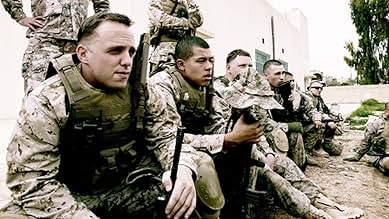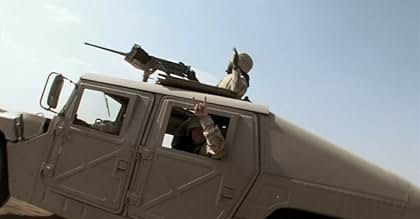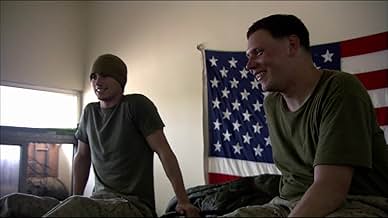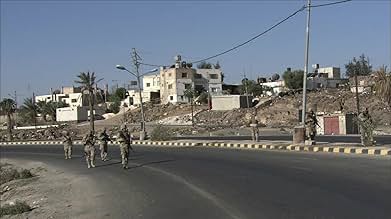IMDb-BEWERTUNG
6,9/10
7641
IHRE BEWERTUNG
Eine Untersuchung des Massakers an 24 Männern, Frauen und Kindern in Haditha, Irak, das von 4 US-Marines als Vergeltung für den Tod eines US-Marineinfanteristen erschossen wurde, der durch e... Alles lesenEine Untersuchung des Massakers an 24 Männern, Frauen und Kindern in Haditha, Irak, das von 4 US-Marines als Vergeltung für den Tod eines US-Marineinfanteristen erschossen wurde, der durch eine Bombe am Straßenrand getötet wurde.Eine Untersuchung des Massakers an 24 Männern, Frauen und Kindern in Haditha, Irak, das von 4 US-Marines als Vergeltung für den Tod eines US-Marineinfanteristen erschossen wurde, der durch eine Bombe am Straßenrand getötet wurde.
- Regie
- Drehbuch
- Hauptbesetzung
- Auszeichnungen
- 3 wins total
Matthew Knoll
- Cpl. Matthews
- (as Matthew R. Knoll)
Thomas Hennessy
- Doc
- (as Thomas Hennessy Jr.)
Ali Adil Disher
- Iraqi Translator
- (as Ali Adil Aj-kaa)
Falah Abraheem Flayeh
- Ahmad
- (as Falah Flayeh)
Empfohlene Bewertungen
It wasn't until very recently that I'd heard of Nick Broomfield and realised he made a couple of documentaries in the early 1980s that I still vividly remember namely SOLDIER GIRLS and THE CHICKEN RANCH . Knowing this I then made a point of catching his recent docudrama GHOSTS about the drowning of 23 illegal Chinese immigrants at Morcombe Bay . I was expecting it to be one of those " blame whitey " polemics , but this is not how it turned out at all with the Chinese gang master being one the most despicable and immoral villains I've seen on the screen in a long time . With this I mind I made a point of buying a ticket for Broomfield's next dramatic venture THE BATTLE OF HADITHA which was being shown at the Edinburgh filmhouse with a Q & A session being held after the showing . Despite the filmhouse brochure proclaiming that this was an even handed film with the marine characters exclusively played by former marines , there was a slight doubt at the back of my mind that we'd be watching guardinista / Michael Moore inspired anti military , anti American rubbish where the Americans are goose stepping Nazis while the Iraqis are entirely peace loving pacifists
I needn't have worried because Broomfield has made a film that will be remembered as being the moral and artistic yardstick as to how other films dealing with the conflict will be judged . Whatever your opinion of the invasion of Iraq ( I like the vast majority of Brits was against it ) there is no way you can heap criticism on TBOH for being pro or anti propaganda for either side . Sure it's anti war but does point out the dangers and frustration faced by both serving soldiers and innocent civilians in a war zone . If there is any type of villain it's probably Al Qaeda itself . Certainly Broomfield deserves congratulations for making a very subtle point that there's a difference between indigenous secular Sunni insurgents who are fighting for their country and those outsiders who want to turn Iraq in to an Islamic theocracy . This probably works best in the scene where the Iraqi insurgent breaks down in tears saying he wished he'd never planted the bomb that leads to the massacre while the sheik rejoices with barely concealed glee that this is a wonderful propaganda coup for Iraq , the more civilians killed by the occupation forces means more recruits for Al Qaeda
If I do have any artistic problems with the mis-en-scene it's that some of the acting is different from what an avid cinema goer is used to . This is in no way a criticism because much of the acting is powerful especially Elliot Ruiz as Cpl Rameirez , even more amazing when you consider there's very few professional actors cast . It's just that when you're very used to life long lighter than life or larger than life performances by ( Insert well regarded big name actor here ) you are slighter aware how different the acting is from what you usually see . Let me repeat though that it's not a real criticism
Respect too to Mr Broomfield for giving a very informative Q & A session after the showing where he was once again very even handed . He did talk a lot of sense where he said that in his humble opinion it should be Bush and Blair who should be on trial instead of the marines which led me to start a round of applause and that peace is coming to Iraq down to the fact that foreign Jihidists are murdering many Iraqis just for the sake of it . He did trip himself up later during the session when he claimed that " Britain and America spent several years arming both sides during the Iran - Iraq war " which led to me shouting " RUBBISH " but there were no hard feelings on either side and I genuinely look forward to Nick's next contribution to narrative cinema . Come to think of it if a Brit can make something so even handed why do we have to endure offensive Anglophobic garbage coming out of Hollywood studios like THE PATRIOT and THE DEVIL'S OWN ?
I needn't have worried because Broomfield has made a film that will be remembered as being the moral and artistic yardstick as to how other films dealing with the conflict will be judged . Whatever your opinion of the invasion of Iraq ( I like the vast majority of Brits was against it ) there is no way you can heap criticism on TBOH for being pro or anti propaganda for either side . Sure it's anti war but does point out the dangers and frustration faced by both serving soldiers and innocent civilians in a war zone . If there is any type of villain it's probably Al Qaeda itself . Certainly Broomfield deserves congratulations for making a very subtle point that there's a difference between indigenous secular Sunni insurgents who are fighting for their country and those outsiders who want to turn Iraq in to an Islamic theocracy . This probably works best in the scene where the Iraqi insurgent breaks down in tears saying he wished he'd never planted the bomb that leads to the massacre while the sheik rejoices with barely concealed glee that this is a wonderful propaganda coup for Iraq , the more civilians killed by the occupation forces means more recruits for Al Qaeda
If I do have any artistic problems with the mis-en-scene it's that some of the acting is different from what an avid cinema goer is used to . This is in no way a criticism because much of the acting is powerful especially Elliot Ruiz as Cpl Rameirez , even more amazing when you consider there's very few professional actors cast . It's just that when you're very used to life long lighter than life or larger than life performances by ( Insert well regarded big name actor here ) you are slighter aware how different the acting is from what you usually see . Let me repeat though that it's not a real criticism
Respect too to Mr Broomfield for giving a very informative Q & A session after the showing where he was once again very even handed . He did talk a lot of sense where he said that in his humble opinion it should be Bush and Blair who should be on trial instead of the marines which led me to start a round of applause and that peace is coming to Iraq down to the fact that foreign Jihidists are murdering many Iraqis just for the sake of it . He did trip himself up later during the session when he claimed that " Britain and America spent several years arming both sides during the Iran - Iraq war " which led to me shouting " RUBBISH " but there were no hard feelings on either side and I genuinely look forward to Nick's next contribution to narrative cinema . Come to think of it if a Brit can make something so even handed why do we have to endure offensive Anglophobic garbage coming out of Hollywood studios like THE PATRIOT and THE DEVIL'S OWN ?
In this new film that few in America will see in theaters, the English documentary filmmaker Nick Broomfield has taken his skill set into a narrative feature of an actual event of the Iraq war and dramatized and embellished it with often harrowing realism. Broomfield has humanized an American atrocity, the so-called "Battle for Haditha" of November 19, 2005, in which several dozen Iraqi civilians in the eponymous town were slaughtered by a small squad of Marines in retaliation for a hidden road bomb that killed one of their men and gravely injured two others. Broomfield humanizes everybody. The "insurgents" who plant the bomb, paid to do it by Al Qaida in Iraq people whom they don't trust or like, are a man who was in the Iraqi army destroyed by Paul Bremer, and his grown son, who sells DVD's to American soldiers. The civilians who happen to live near the road where the bomb goes off are seen up close, a child fascinated by chickens, a big family, a circumcision party, a couple with a child on the way who are deeply in love. All these are made real and known to the audience by the film. But so are the Marines, especially the main one, Corporal Ramirez (Elliot Ruiz), who though barely twenty, is so battle-weary he is haunted by dreams and guilt and cannot sleep. It's Ramirez who, cracking under the strain and the sleeplessness and given the go-ahead by corps superiors off somewhere with electronic maps (distant kills are like a video game), leads the rampage of murders, then collapses and weeps when rising for another day.
All this is very interesting, and the killings are similar to those in De Palma's flashy but so very slipshod 'Redacted,' but so very, very different in this new context with the simpler shoot--just a digital camera that you can forget about after a while, whereas De Palma rubs your nose in the multiple media feeds, the other American soldiers less specific here but cruder and perhaps more authentic; some of them like Ruiz were in the war themselves, and served, and know the way to act without being told.
But what is extraordinary in Broomfield's film isn't any of this so much as one thing that typically, American reviewers have hardly seemed to notice. This is: that not only are the Iraqis seen up close, they are real Iraqis, speaking Iraqi Arabic, and many of them, like the young actor who plays Ramirez, also on the other side as victims and non-combatants, veterans of the war, now living where the film was made and where they fled to, in Jordan. When Ramirez shows a big scar on his leg and says he almost lost it, it's Ruiz's real battle scar. Ruiz's performance has a new kind of conviction.
Why would Americans' notice that about the Iraqi Arabic, the authentic Iraqi non-actors playing the roles of insurgents and local inhabitants, and why would they care? In fact even the Choir to whom this anti-war movie is preaching are as ignorant and indifferent to the specifics of Middle Eastern cultural reality as the naive and headstrong men who got us into the war and the poor and uneducated boys who have pursued it and died in it and come back maimed and mentally damaged from it. But in the future, this may come to matter, and even be understood by American Iraq war veterans. Language is important, and culture is important. One shouldn't have to say that. But if it were understood, the imperial indifference of "bringing democracy to the Middle East" would crumble, and it wouldn't seem so easy to think that killing a hundred thousand civilians would make us friends.
Using real Iraqis and a lead Marine who's an Iraq war vet were master strokes, but this doesn't excuse the film from being in many ways self-damagingly roughshod and, despite the multiple viewpoints, still skewed at times. The Iraqi civilians who become victims are given a fairy tale simplicity, their complicity or involvement in weapons and explosives, though alluded to, not specified for any of the victims. There needed to be something more specific about a Marine other than Ramirez.
The chief bad guys, which seems right, are those at one remove, the Marine supervisors away from the front, and the local imam whose encouraging the locals to ignore the danger and hold a celebration is a cynical gesture to worsen the casualties and make them seem more cruel to the media.
Broomfield has used blunt instruments to shape his story, and his ending is a little muddled (partly from necessity, since the accused Marines hadn't yet been tried). Nonetheless the authenticity, particularly of the Iraqis, but of the whole scene, wins The Battle of Haditha a special place in the less-than-stellar roster of Iraq war films thus far delivered.
All this is very interesting, and the killings are similar to those in De Palma's flashy but so very slipshod 'Redacted,' but so very, very different in this new context with the simpler shoot--just a digital camera that you can forget about after a while, whereas De Palma rubs your nose in the multiple media feeds, the other American soldiers less specific here but cruder and perhaps more authentic; some of them like Ruiz were in the war themselves, and served, and know the way to act without being told.
But what is extraordinary in Broomfield's film isn't any of this so much as one thing that typically, American reviewers have hardly seemed to notice. This is: that not only are the Iraqis seen up close, they are real Iraqis, speaking Iraqi Arabic, and many of them, like the young actor who plays Ramirez, also on the other side as victims and non-combatants, veterans of the war, now living where the film was made and where they fled to, in Jordan. When Ramirez shows a big scar on his leg and says he almost lost it, it's Ruiz's real battle scar. Ruiz's performance has a new kind of conviction.
Why would Americans' notice that about the Iraqi Arabic, the authentic Iraqi non-actors playing the roles of insurgents and local inhabitants, and why would they care? In fact even the Choir to whom this anti-war movie is preaching are as ignorant and indifferent to the specifics of Middle Eastern cultural reality as the naive and headstrong men who got us into the war and the poor and uneducated boys who have pursued it and died in it and come back maimed and mentally damaged from it. But in the future, this may come to matter, and even be understood by American Iraq war veterans. Language is important, and culture is important. One shouldn't have to say that. But if it were understood, the imperial indifference of "bringing democracy to the Middle East" would crumble, and it wouldn't seem so easy to think that killing a hundred thousand civilians would make us friends.
Using real Iraqis and a lead Marine who's an Iraq war vet were master strokes, but this doesn't excuse the film from being in many ways self-damagingly roughshod and, despite the multiple viewpoints, still skewed at times. The Iraqi civilians who become victims are given a fairy tale simplicity, their complicity or involvement in weapons and explosives, though alluded to, not specified for any of the victims. There needed to be something more specific about a Marine other than Ramirez.
The chief bad guys, which seems right, are those at one remove, the Marine supervisors away from the front, and the local imam whose encouraging the locals to ignore the danger and hold a celebration is a cynical gesture to worsen the casualties and make them seem more cruel to the media.
Broomfield has used blunt instruments to shape his story, and his ending is a little muddled (partly from necessity, since the accused Marines hadn't yet been tried). Nonetheless the authenticity, particularly of the Iraqis, but of the whole scene, wins The Battle of Haditha a special place in the less-than-stellar roster of Iraq war films thus far delivered.
i personally never heard of Mr. Bloomfield, so i had no real intention of watching this film till i saw it mentioned in the message boards for other films. that said, i must say this was the best in the recent slew of Iraq war films (like Redacted, Home of the Brave, etc.) i half expected it to be like Redacted and was pleasantly surprised to find it much better. i think it really brought out the fact that there are multiple sides to a story, and did so without too much bias. being a Muslim myself i must admit that it seemed a little inclined towards Iraqis, with Marines portrayed as undisciplined and emotionless (though one of the protagonists feels guilt and in reality this incident caused an uproar). there are no A-list actors, which in a sense, actually made the movie better because you almost see the actors as the characters themselves (especially since a lot of the dialog is improvised). i think it was well made, and well thought out. better than expected. i wonder what the US reaction would if/when it has a release there? unlike Moore's work (as stated by another user here) neither party is shown as completely innocent or completely evil. i'm not sure if this is exactly how the incident took place, but if it is, then there is certainly some food for thought in this movie.
It's almost impossible to be totally objective regarding a subject about which one is truly passionate. The war in Iraq is a subject that divides people like no other in recent times. As with any conflict, the war in Iraq has its supporters and its detractors. There is no middle ground. There are no grey areas: everything is just black or white. Either you believe it's a justifiable war, or you don't. This brings me to Nick Broomfield's new film, "The Battle For Haditha". The subject of the film is controversial as it deals with an incident in the city of Haditha, allegedly involving the US Marines. Broomfield uses actors, some of whom are former US Marines and Iraq veterans, as well as Iraqi refugees, to fashion a film that successfully straddles the gap between a regular documentary and a straightforward feature film. The film encompasses three points of view: those of the Marines, the insurgents, and the families who lived near where the roadside bomb detonated. This film is a fictionalised account of what actually happened at Haditha. It shows quite graphically, the horrors of war and what the Americans as well as innocent Iraqis have to go through almost on a daily basis. There are deaths on both sides, but it's Iraqi civilians who are caught in the crossfire and who have to bear the brunt of dealing with men who have been stretched to breaking point. The film in no way condones the actions of either the insurgents or the Marines. It just shows the audience what might have occurred on that fateful day, and it's for those in the audience to make up their own minds as to who was in the right and who was in the wrong. When reading some of the comments posted on the message board for this film, I find it somewhat puzzling that some contributors write that "Battle For Haditha" is anti-American. Just because the US Marines are shown in a less than sympathetic light in this film, does not mean the film is on the side of the insurgents. What the film does demonstrate is how quickly things can get out of hand, in a situation such as that in Haditha. By all means criticize a film on its merits, or lack of them. Please, though, do not label this film as un-American just because it doesn't fit a blinkered view of the way the world is.
10avakian1
I just saw this movie and found it very moving. I have spent some time with Iraq veterans and I feel this movie did a very accurate job portraying what they went through.
I think it's important to point out that 12 of the actors, including Ruiz, who plays Corporal Ramirez, are themselves Iraq veterans. Here are some quotes from Ramirez: "I was 17 when I was sent to Iraq, during the initial invasion. We pushed all the way up to Tikrit and I ended up being wounded, I almost lost my life. It's crazy, people don't know the type of things that we go through. That's what I like about the film, it shows that." The concept of taking Iraq refugees and ex-marines to make a movie with no script is brilliant. I felt the improvisation from these actors was likely better and more realistic than anything professional actors could have pulled off. I was also impressed with the production values, especially since no US funds were available for a fair and honest portrayal of such events.
I think it's important to point out that 12 of the actors, including Ruiz, who plays Corporal Ramirez, are themselves Iraq veterans. Here are some quotes from Ramirez: "I was 17 when I was sent to Iraq, during the initial invasion. We pushed all the way up to Tikrit and I ended up being wounded, I almost lost my life. It's crazy, people don't know the type of things that we go through. That's what I like about the film, it shows that." The concept of taking Iraq refugees and ex-marines to make a movie with no script is brilliant. I felt the improvisation from these actors was likely better and more realistic than anything professional actors could have pulled off. I was also impressed with the production values, especially since no US funds were available for a fair and honest portrayal of such events.
Wusstest du schon
- WissenswertesThe film was shot in an unconventional way whereas instead of a detailed script, there was only an outline of each scene and where the story was going. Actors would then improvise much of the dialogue based on director Nick Broomfield's instructions.
- PatzerAll of the Iraqi Army soldiers in the film are seen wearing the "three-color" DCU uniform, although in the time period that the movie takes place in (late 2005), the Iraqi military wore the "chocolate-chip" DBDU uniform.
- VerbindungenReferences Breaking News (2004)
Top-Auswahl
Melde dich zum Bewerten an und greife auf die Watchlist für personalisierte Empfehlungen zu.
- How long is Battle for Haditha?Powered by Alexa
Details
- Erscheinungsdatum
- Herkunftsland
- Offizieller Standort
- Sprachen
- Auch bekannt als
- Lô Cốt Bất Tử
- Drehorte
- Produktionsfirmen
- Weitere beteiligte Unternehmen bei IMDbPro anzeigen
Box Office
- Bruttoertrag in den USA und Kanada
- 10.310 $
- Eröffnungswochenende in den USA und in Kanada
- 1.982 $
- 11. Mai 2008
- Weltweiter Bruttoertrag
- 245.521 $
- Laufzeit
- 1 Std. 37 Min.(97 min)
- Farbe
- Sound-Mix
- Seitenverhältnis
- 2.35 : 1
Zu dieser Seite beitragen
Bearbeitung vorschlagen oder fehlenden Inhalt hinzufügen





















